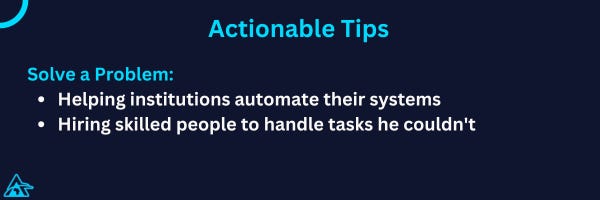
Mike Macharia was sitting in his company’s office, Seven Seas Technologies (SST), in the heart of Nairobi.
The AC was cooling the room, and he was ready for the new day to run a $30 million-valued company.
But something caught his attention, a letter lying on his desk.
He checked the sender, and his eyes widened.
It was from one of his biggest clients so far, the Kenyan Ministry of Health.
Without hesitation, he tore it open, scanning the words quickly.
Termination Letter!
In other words, Kenya’s Ministry of Health had just canceled SST’s KSh 4.7 billion contract to digitize 98 state hospitals.
The excuse? Unmet requirements, including the absence of a government letter of support, a document that was essential for securing financing for the project.
It is one of those moments that test an entrepreneur’s resilience.
Instead of backing down, Macharia took the fight to court, arguing that the government’s failure to provide the letter prevented SST from fulfilling its obligations.
Long story short.
A former judge Aaron Ringera ruled in favor of SST, awarding the company KSh 1.59 billion in compensation for breach of contract and lost earnings.
But that wasn’t all.
The Ministry of Health was also ordered to pay an additional KSh 52 million to cover SST’s legal expenses.
A battle won.
But how did SST grow into an eight-figure company in the first place?
Let’s reverse-engineer it from the beginning.
The Creation of Seven Seas Technologies Business
An opportunity arose during a social gathering, a chance to fly to Rwanda and help automate the system of what is today Rwanda Air.
There was just one problem. With a financial education background, Mike had no tech skills.
But that didn’t stop him. He assembled a tech team and left for Rwanda, determined to capture the opportunity.
And that’s how Seven Seas Technologies (SST) was born.
The name “Seven Seas” was carefully chosen to represent a company without geographical limitations.

First Customers: Entering the Rwandan Market
After successfully completing an IT systems project for Rwanda’s national carrier, Seven Seas Technologies (SST), led by Mike Macharia, gained recognition for its expertise.
This achievement caught the attention of the Rwandan military, which later approached SST for a project.
Mike delivered a presentation to military officials, and as a result, SST secured the contract.
He seized the opportunity, despite lacking the technical skills himself, because he understood something crucial, skills could be hired, but opportunities like this wouldn’t come twice.
While networking played a key role in securing his first clients, landing a contract with a foreign government institution at just 26 years old was, to say the least, remarkable.

First Income: Building Financial Foundations
The Rwandan contracts provided SST with its initial revenue stream, allowing the company to gain traction in the regional market.
This early revenue enabled SST to reinvest in operations, hire skilled professionals, and build its reputation in the East African IT sector.
The success of these projects also positioned the company for larger government and corporate contracts, proving its ability to execute complex IT solutions at scale.
Following these initial deals, SST expanded its client base by targeting key industries, including government, defense, and healthcare.
At this point, Mike was ready to enter the growth phase and strategies it
Growth: Diversification and Strategic Partnerships
As SST’s reputation grew, it attracted the attention of prominent investors.
- The late James Gachui, a notable Kenyan tycoon, became a significant shareholder and served as the board chairman.
- Additionally, the Abraaj Group acquired a 21% stake in SST, providing capital to fuel further growth.
- Toyota Tsusho later acquired a 9.5% stake for KSh 300 million ($3 million), further fueling expansion.
- Mike’s 35% shareholding was valued at Ksh 1.12 billion($10 million), marking his entry into Kenya’s billionaire echelon.
These partnerships helped SST to invest in its growth strategy.
Scaling the business
Scaling required bigger contracts, so Macharia shifted focus from small contracts to long-term partnerships with governments and multinational corporations.
- SST built credibility by successfully executing projects for Rwanda’s national airline and military, which positioned the company as a trusted provider for large-scale IT projects.
- He targeted large organizations, including governments, healthcare institutions, and corporate enterprises, ensuring long-term revenue streams.
- By securing multi-million dollar deals, SST established a strong revenue base, allowing it to invest in further scaling efforts.

Building His Company Brand
SST is not widely known across Africa or even Kenya.
Why? Because it is a highly specialized B2B company that works with government institutions and large enterprises.
His goal is to ensure that his select group of potential clients knows about the company.
- Positioned SST as a company capable of delivering comprehensive IT solutions.
- Established SST as a leader in digital transformation across Africa, focusing on governmental and healthcare digitization as well as large-scale infrastructure projects.
Mike Macharia built Seven Seas Technologies (SST) into a recognized brand by delivering high-quality IT solutions and forming strategic partnerships with key institutions like Rwanda Air, the Rwandan military, and the Kenyan government.
Building His Personal Brand
Beyond his company, Mike built his personal brand by actively engaging in:
- Entrepreneurship forums, tech conferences, and leadership panels.
- He leveraged networking, media interviews, and mentorship initiatives to establish himself as an authority in technology and business leadership.
His ability to adapt, innovate, and take risks strengthened his credibility, making him a sought-after business strategist and investor in Africa’s tech ecosystem.

Expansion: Pan-African Ambitions
Embracing a pan-African vision, SST expanded its footprint beyond Kenya and Rwanda into countries such as:
- Ethiopia
- Zambia
- Zimbabwe
- Ghana
- Nigeria.
- The company also established a presence in Europe through a Portuguese subsidiary.
This strategic expansion diversified SST’s revenue streams and mitigated reliance on the Kenyan market. By 2016, 80% of the company’s revenue originated from Kenya, with 15% from Ethiopia. Plans were underway to balance this distribution, aiming for a more equitable revenue share across its operational regions.

Financial Revenue Growth
Over a 15-year period, SST’s valuation soared to Ksh. 3.2 billion ($31 million) in 2016 reflecting its rapid growth and successful business model.
The healthcare sector emerged as a significant revenue driver, contributing to 60% of SST’s income.
It has been difficult to find any revenue amount,
but it’s estimated to be:
$14.4 million




